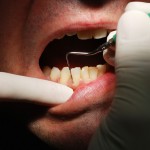
Bacterial infection has been considered as a possible cause of adverse pregnancy outcomes perinatal mortality (PNM), preterm birth (PTB) and low birth weight (LBW). Periodontal disease is very common and has been implicated as one possible causal factor of adverse pregnancy outcomes and a number of trials and reviews have examined this relationship. The aim of this study was to update a meta-analysis including a reassessment of bias risks and meta-regression to assess possible effects of confounders, and trial sequential analysis to assess the risks of random errors.
Methods
This meta-analysis is based on a previous review by Kim et al and included two trials published since that review. A risk of bias assessment was carried out by two reviewers independently using the Cochrane Collaboration approach. Conventional meta-analysis was performed with random-effects models using the DerSimonian-Laird method, with odds ratio and 95% confidence intervals being calculated. Heterogeneity was assessed using both Cochrane’s Q and I2-statistics with publication bias being assessed graphically and statistically. Subgroup analysis was used to compare different studies with low and high risk of bias and different populations. Trial sequential analysis was used to assess risk of random errors.
Results
- 13 trials involving a total of 6283 pregnant women were included.
- 13 studies provided data for PTB and PNM and 10 regarding LBW.
- 4 studies were considered to have low risk of bias, 9 high risk of bias.
- Overall, periodontal treatment had no significant effect on
- Preterm birth OR = 0.79 (95% CI; 0.57-1.10) or
- Low birth weight OR = 0.69 (95% CI; 0.43-1.13)
- For populations with moderate occurrence (< 20%) of preterm birth or low birth weight, periodontal treatment was not efficacious for any of the outcomes, and trial sequential analyses indicated that further trials might be futile.
- For populations with high occurrence (≥ 20%) of preterm birth and low birth weight, periodontal treatment seemed to reduce the risk of preterm birth (OR=0.42 [0.24-0.73]) and low birth weight (OR= 0.32 [0.15-0.67]), but trial sequential analyses showed that firm evidence was not reached.
- Periodontal treatment did not significantly affect perinatal mortality, and firm evidence was not reached. Risk of bias, but not publication bias or patients’ age modified the effect estimates.
Conclusions
The authors concluded:
Providing periodontal treatment to pregnant women could potentially reduce the risks of perinatal outcomes, especially in mothers with high risks. Conclusive evidence could not be reached due to risks of bias, risks of random errors, and unclear effects of confounding. Further randomised clinical trials are required.
Comments
The authors highlight that this study should not be regarded as a systematic review as no systematic search to identify all the available studies was undertaken. The study updates an earlier systematic review and meta-analysis by Kim et al with the addition of two subsequent RCTs. Overall the findings show that the general provision of periodontal treatment does not seem to prevent adverse pregnancy outcomes and the authors conclude that the main indication for providing periodontal treatment during pregnancy should be periodontal disease itself. As with the Kim et al review, there is a suggestion that there may be a benefit form periodontal treatment for those in area at high risk of adverse pregnancy outcomes. However, the authors also highlight issues with potential confounders for example baseline periodontal status, the care provision and its timing. In addition to this review and the Kim study, there have been at least 17 previous reviews of this topic based on a limited number of trials (Dental Elf – 15th Feb 2013).
Links
Schwendicke F, Karimbux N, Allareddy V, Gluud C. Periodontal treatment for preventing adverse pregnancy outcomes: a meta- and trial sequential analysis. PLoS One. 2015 Jun 2;10(6):e0129060. doi: 10.1371/journal.pone.0129060. eCollection 2015. PubMed PMID: 26035835; PubMed Central PMCID: PMC4452791.
Kim AJ, Lo AJ, Pullin DA, Thornton-Johnson DS, Karimbux NY. Scaling and root planing treatment for periodontitis to reduce preterm birth and low birth weight: a systematic review and meta-analysis of randomized controlled trials. J Periodontol. 2012 Dec;83(12):1508-19. doi: 10.1902/jop.2012.110636. Epub 2012 Mar 1. PubMed PMID: 22376207.
Dental Elf – 15th Feb 2013 – Periodontal treatment, pre-term birth and low birth weight

Periodontal treatment had no significant effect on preterm birth http://t.co/qK1b7Oe4ma
“Periodontal treatment and adverse pregnancy outcomes,” posted by Derek Richards for The Dental Elf, September 30, 2…https://t.co/MHxL4W0y1Z
Periodontal treatment does not seem to prevent adverse pregnancy outcomes http://t.co/qK1b7Oe4ma
Periodontal treatment had no significant effect on low birth weight http://t.co/qK1b7Oe4ma
Don’t miss-Periodontal treatment and adverse pregnancy outcomes http://t.co/qK1b7Oe4ma
Periodontal treatment and adverse pregnancy outcomes http://t.co/JC0zJ17nVQ via @TheDentalElf
[…] Periodontal treatment and adverse pregnancy outcomes […]